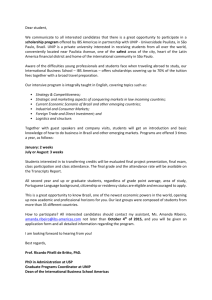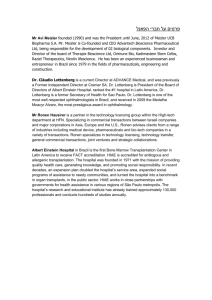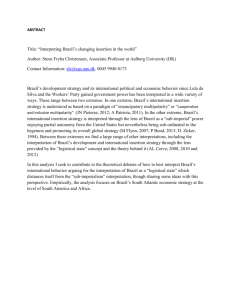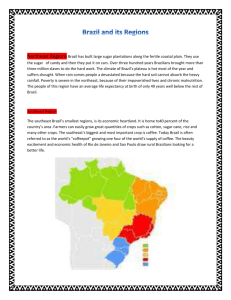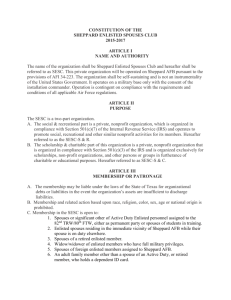Danilo Santos De Miranda - Edinburgh International Culture Summit
advertisement
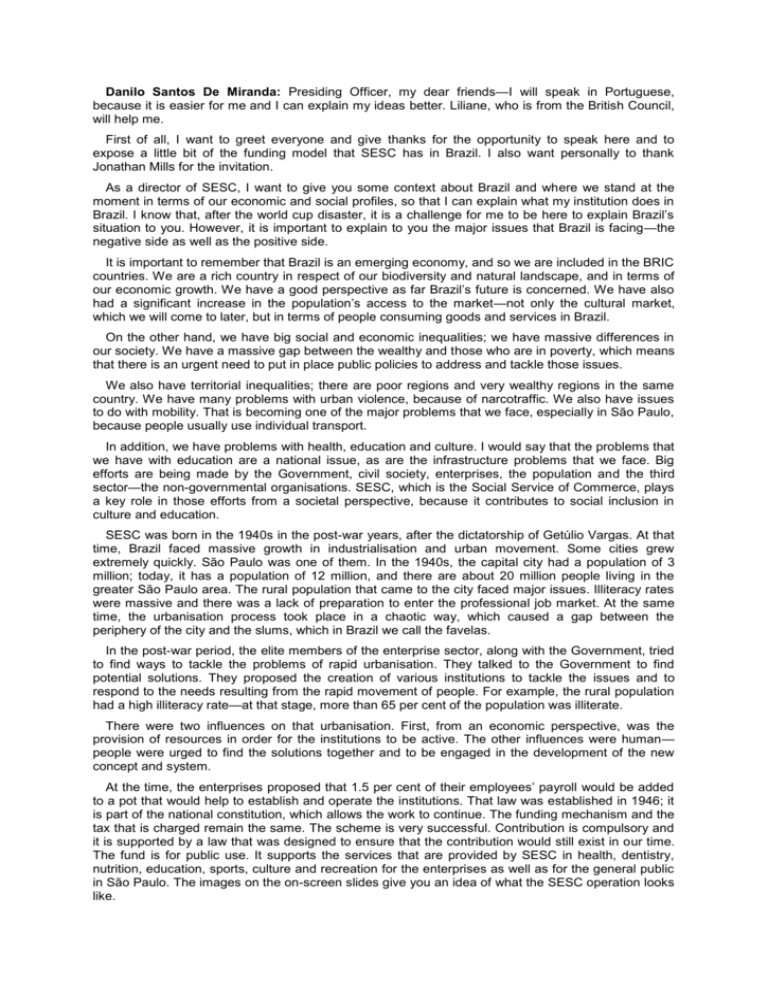
Danilo Santos De Miranda: Presiding Officer, my dear friends—I will speak in Portuguese, because it is easier for me and I can explain my ideas better. Liliane, who is from the British Council, will help me. First of all, I want to greet everyone and give thanks for the opportunity to speak here and to expose a little bit of the funding model that SESC has in Brazil. I also want personally to thank Jonathan Mills for the invitation. As a director of SESC, I want to give you some context about Brazil and where we stand at the moment in terms of our economic and social profiles, so that I can explain what my institution does in Brazil. I know that, after the world cup disaster, it is a challenge for me to be here to explain Brazil’s situation to you. However, it is important to explain to you the major issues that Brazil is facing—the negative side as well as the positive side. It is important to remember that Brazil is an emerging economy, and so we are included in the BRIC countries. We are a rich country in respect of our biodiversity and natural landscape, and in terms of our economic growth. We have a good perspective as far Brazil’s future is concerned. We have also had a significant increase in the population’s access to the market—not only the cultural market, which we will come to later, but in terms of people consuming goods and services in Brazil. On the other hand, we have big social and economic inequalities; we have massive differences in our society. We have a massive gap between the wealthy and those who are in poverty, which means that there is an urgent need to put in place public policies to address and tackle those issues. We also have territorial inequalities; there are poor regions and very wealthy regions in the same country. We have many problems with urban violence, because of narcotraffic. We also have issues to do with mobility. That is becoming one of the major problems that we face, especially in São Paulo, because people usually use individual transport. In addition, we have problems with health, education and culture. I would say that the problems that we have with education are a national issue, as are the infrastructure problems that we face. Big efforts are being made by the Government, civil society, enterprises, the population and the third sector—the non-governmental organisations. SESC, which is the Social Service of Commerce, plays a key role in those efforts from a societal perspective, because it contributes to social inclusion in culture and education. SESC was born in the 1940s in the post-war years, after the dictatorship of Getúlio Vargas. At that time, Brazil faced massive growth in industrialisation and urban movement. Some cities grew extremely quickly. São Paulo was one of them. In the 1940s, the capital city had a population of 3 million; today, it has a population of 12 million, and there are about 20 million people living in the greater São Paulo area. The rural population that came to the city faced major issues. Illiteracy rates were massive and there was a lack of preparation to enter the professional job market. At the same time, the urbanisation process took place in a chaotic way, which caused a gap between the periphery of the city and the slums, which in Brazil we call the favelas. In the post-war period, the elite members of the enterprise sector, along with the Government, tried to find ways to tackle the problems of rapid urbanisation. They talked to the Government to find potential solutions. They proposed the creation of various institutions to tackle the issues and to respond to the needs resulting from the rapid movement of people. For example, the rural population had a high illiteracy rate—at that stage, more than 65 per cent of the population was illiterate. There were two influences on that urbanisation. First, from an economic perspective, was the provision of resources in order for the institutions to be active. The other influences were human— people were urged to find the solutions together and to be engaged in the development of the new concept and system. At the time, the enterprises proposed that 1.5 per cent of their employees’ payroll would be added to a pot that would help to establish and operate the institutions. That law was established in 1946; it is part of the national constitution, which allows the work to continue. The funding mechanism and the tax that is charged remain the same. The scheme is very successful. Contribution is compulsory and it is supported by a law that was designed to ensure that the contribution would still exist in our time. The fund is for public use. It supports the services that are provided by SESC in health, dentistry, nutrition, education, sports, culture and recreation for the enterprises as well as for the general public in São Paulo. The images on the on-screen slides give you an idea of what the SESC operation looks like. I need to point out two very important aspects. The first is that we have regional administrations, so every state has the autonomy to decide how it wants to operate. It is also important that we are audited and controlled by the Government, as the public power, because it wants to check how and when we are spending the money. It is important also to remind you that when SESC was created in 1940 we had more of a welfare role and, in a way, a paternalist role. Over the years we became more focused on development of people’s autonomy and the development of education as an important resource for citizenship. Today, we can say that culture sits at the heart of what SESC does, but we mean culture on a wider spectrum that includes the arts, sports and social wellbeing as well as having other meanings. The reason why we approach culture in a wider way is that we undertake transversal activity in our work and operations; we approach culture in a transversal way. It is important to say that our programme is a national and international one that is very focused on capacity building and on preparing people for culture and the arts, so SESC’s work has massive scope; we are active across the whole of Brazil. In São Paulo state, for example, we have 35 units, with a huge network of theatres and sports and culture centres, and services for health, dentistry, elderly people, children and so on. We have big international connections, so we have loads of theatre companies performing through SESC. We also provide support to take Brazilian performers outside Brazil. We have, of course, strong links with cultural organisations including the British Council that are present in Brazil. For us, those international links are really important because they foster new links, and they respect diversity and culture in its broader sense. I would like to emphasise that, for us, culture is the only way in which countries can grow, develop and be successful. Thank you.
